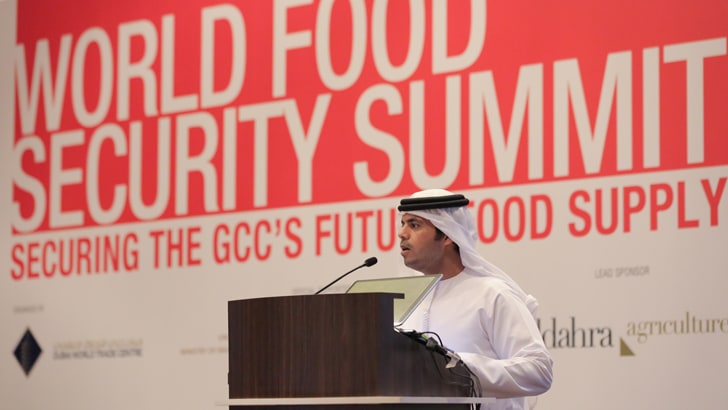
With the UN predicting that the world will need to provide 70% more food in order to feed a global population of 9.6 billion people in 2050, the question of how nations can ensure a safe and secure supply of food has become increasingly pertinent. In an effort to highlight the seriousness of the issue the organisers of Gulfood 2014 in Dubai dedicated a two-day World Food Security Summit to the subject over 23-24 February.
The summit, attended by more than 300 government ministers, thought-leaders and a host of C-suite executives from across the industry, sought to discuss and debate how both developing and developed nations can work closer to secure consistent, value for money and secure food supplies for a soaring population.
In a keynote address His Excellency Engineer Saif Al-Shara, assistant undersecretary, Agricultural Affairs and Animal Sector in the UAE said “there is no doubt that this is a global priority and the contribution and commitment from all parties participating in this significant summit will help feed the world’s population in the future.”
He stressed that the UAE remains “committed to the international goal of eradicating poverty and hunger,” citing the emirates’ backing of the 2012 Zero Hunger campaign.
In a panel session, chaired by Gulfstat’s Trevor McFarlane, government ministers for agriculture from four major export countries debated the merits of their respective attempts to implement a more sustainable food security policy.
Hon Peter Walsh, minister for agriculture and food security for Victoria, Australia’s largest export state and responsible for 86% of the country’s dairy export, said that productivity had doubled in the last 30 years in Australia because of increased investment in R&D. An AUS$2bn investment in Victoria’s water supply has also benefited the region immeasurably, he said. “I’m a great believer that science and innovation will help us to solve the problem” of global food security,” he added.
Canadian Lyle Stewart, the Saskatchewan minister of agriculture, told attendees that careful management of his region’s abundant natural resources and consistent investment in innovation has resulted in the state becoming a leading exporter of wheat and maize. Saskatchewan boasts 18.2million hectares of cultivated farmland and is home to 37,000 large farms.
“Food security has no borders and we’re all working toward the same goal to ensure producers have the capacity to grow healthy food in great quantities,” he said.
He also stressed the importance of science-based regulation in the industry. “We need bigger, healthier crops” in order to deal with a population that rises “by 200,000 people every day, 70 million each year,” he said, emphasising that nations need to do more to “discuss the issues and work collaboratively”
The UK’s parliamentary undersecretary of state for farming, food and marine environment George Eustice agreed that open and transparent discussions about the issues of food security were the only way to deal with the soaring demand for food. “We must strive to free up markets and promote free trade,” he said, citing the important work achieved by the G20 meeting in 2011 to promote transparency and remove barriers. “We have an opportunity for the next leap forward,” said Eustice. “Sustainability is vitally important. Agriculture uses 70% of the world’s fresh water resource so growth must be sustainable.”
With one in eight people suffering from chronic hunger and lack of sufficient food in order to enjoy a healthy lifestyle, Argentina’s minister of foreign affairs Hector Timmerman blamed “anarchic capitalism” and the “inequality of the multilateral trade system” for the high levels of hunger across the world.
He accused developed countries for “making it impossible” for poorer nations to compete, citing that Western trade restrictions, such as those linked to protecting animal well-being, meant that “everything works against the developing countries. I think it’s more important to look at human welfare first,” he said.
Timmerman also stressed that Argentina’s “embracing of new technology and innovation” had enabled his country to avoid job losses in the agricultural industry and to “add value at the place of origin of production.”
After the panel session the UAE’s Essa Al Ghurair, chairman of Al Ghurair Resources presented “the other side of the coin” in showcasing a view of “food security from a receiver’s side.” Food consumption has been growing “at a rate of 12% per year in the UAE and the demand for food staples has increased by 30%,” he said. The world needs to “export knowledge and hands-on expertise” to improve agriculture said Al Ghurair. “We have to understand the whole chain from farmers to end-users.”
Another highlight of the summit was a panel session featuring expert comment from senior executives of some of the world’s largest food producers. Sanjiv Kakkar, chairman of Unilever MENA and Turkey, Ghislain Desjardins head of Middle East, Pakistan and North Africa for DuPont, Yves Manghardt, chairman and CEO of Nestle Middle East FZE and Vishal Tikku, regional managing director for Mondelez International (formerly Kraft Foods) discussed the importance of knowledge transfer and working directly with farmers in order to get better, sustainable yields.
However, despite all four multinationals pledging investment and support to farmers in developing economies, there are limits to what they can do, they said. “We can’t make all the difference,” said Tikku. “We need regulatory authorities to make sure what we do is carried through. Real social change must be assisted by government and non-government agencies.”
The view was reiterated by Unilever’s Kakkar who also endorsed the importance of a multi-stakeholder approach.
“We believe in taking a long-term view on how we source [commodities]. We work with certification agencies such as the Rainforest Alliance and Fairtrade to ensure that by 2020 our entire agricultural sourcing should be sustainably sourced,” he said.
Michael Jones
